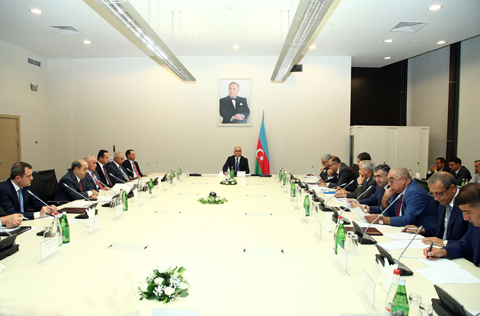Prospects of Azerbaijan-EU relations in spotlight

By Aynur Jafarova
The fourth meeting of the Azerbaijan State Commission for European Integration was held on August 24, the Azerbaijani Economic Development Ministry said.
During the meeting the parties discussed the prospects of developing the relations between Azerbaijan and the European Union (EU).
In his remarks Economic Development Minister, chairman of the State Commission, Shahin Mustafayev, said that the strategy of multilateral development, successfully carried out by President Ilham Aliyev, has provided social and economic development of the country and increased its economic power in a short time.
According to him, thanks to this strategy Azerbaijan has integrated into the system of international economy.
Mustafayev went on to say that political and macroeconomic stability, democratic and independent society, respect to human rights and freedoms as well as a successful national model of social-economic development has turned Azerbaijan into a reliable partner in the area of international relations.
The minister said one of the main directions of Azerbaijan's foreign policy is the establishment and development of permanent and fruitful relations with the EU. The basis of these relations was founded in 1999 with the signing of the Partnership and Cooperation Agreement as well as Azerbaijan's joining the European Neighborhood Policy.
Mustafayev also said that the action plan adopted in 2006 within this policy, the Eastern Partnership initiative joined by Azerbaijan as well as the agreements on energy cooperation fostered grounds for the development of bilateral and multilateral relations with the EU.
The EU is the main trade partner of Azerbaijan. Last year the trade turnover between Azerbaijan and the EU exceeded 41 percent of the total share of trade, while it amounted to 43.7 percent in the first half of 2013.
Most of the investments by the EU countries in the main capital and the oil and gas sector of Azerbaijan amounted to 51 and 36.5 percent respectively in the last 10 years.
Azerbaijan has signed agreements on lifting double taxation with 20 EU countries, and agreements on mutual preservation and promotion of investment with 17 EU countries. Furthermore, the country has established an intergovernmental commission jointly with 13 EU countries, Mustafayev said.
Impetuous development of Azerbaijan has created conditions for making investment in various European countries. Currently Azerbaijan plays an important role in providing the energy security of Europe and the Trans-Adriatic Pipeline (TAP) is a wonderful example of strategic partnership in the energy sector.
Mustafayev said further that Azerbaijan and the EU have a wide range of opportunities to discuss prospects of future cooperation. Permanent meetings are being held within the various platforms and panels of the Eastern Partnership initiative, Partnership and Cooperation Agreement, the cooperation council, the interparliamentary committee on cooperation, Euronest and other bodies.
The current status of the European Neighborhood Policy and the Eastern Partnership initiative, possibilities of legal, political, economic, trade, social and religious cooperation as well as the EU's various assistance programs are under discussion.
Azerbaijan's Deputy Foreign Minister Mahmud Mammadguliyev and deputy head of the Presidential Administration Novruz Mammadov also made speeches at the meeting.
The meeting made decisions on an action plan to bring the Azerbaijani legislation into accordance with the EU legislation and improvement of the work of the State Commission for European Integration.
In 2009, the EU passed a decision to sanction negotiations on the conclusion of bilateral association agreements of Azerbaijan, Georgia and Armenia with the organization. The negotiations on the Association Agreement started in July 2010.
The Association Agreement covers four areas - political dialogue, including issues of security, justice and human rights, economic, social and humanitarian issues, and trade. Negotiations are conducted regarding all these areas.
The Eastern Partnership initiative was adopted at the initiative of Poland and Sweden and approved at the EU summit in Brussels in 2008.
The program includes Azerbaijan, Georgia, Armenia, Moldova, Ukraine and Belarus. It provides for a significant increase in the level of political interaction, broad integration of the former Soviet republics into the EU economy, increasing the amount of financial assistance to these countries and strengthening energy security.
